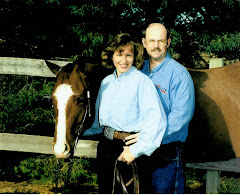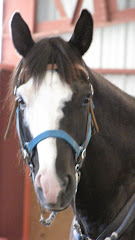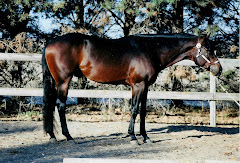Join the Horses Are Our Lives Chat Group to discuss this topic, as well as other Training Tips and Centered Riding exercises. We talk about the overall health and well being of the horse, also. Brenda
Will this Rhino Virus outbreak turn into an epidemic? Only time will tell. I pray everyone can keep their horse safe. Please consider staying home and limit horse travel for the next 2-3 weeks. Let's see what is happening before we unknowingly spread the virus, or bring it back home to our other horses. I don't want to see my herd sick. I don't want to see another horse die for a long time. I think that is what is bothering me the most. Losing Finny, yes, it has made me goosey. About everything. But if the virus came here, and horses became positive, I would have to put them down. There is no way I could afford the medicine. Al Dunning, a prominent Cutting Horse trainer, reported that he spent $11,000 within a week to medicate 3 sick horses. Yes, these are world champions or of that caliber, so well worth the money. So are my horses, but I don't have those kind of funds to spend on medicine, even though my heart would want to do that. I would have to shut off all emotions if Starlet, or Duke, or Duster, or Shaggy, or any of the others, including my 2 new babies that are almost here, would get sick and die.
Emotions aside, please make the decision that best suits you and your horses. For me, my facility is closed to horse traffic for the next 2-3 weeks. I'll be riding the fields alone. Hopefully, I can get my husband to ride with me a few times. I will request that anyone coming here to visit, if they have horses at home, change clothes and disinfect their footwear before leaving home. I'm lucky though, that all the families, except one, don't have other horses at home. I only "think" my place is safe. I did take Shaggy to a dressage lesson at another barn last Tuesday, May 10, and this Tuesday, May 17. I'm praying that there are no sick horses at that barn. With this "spider web" effect that the states have been talking about, we have no way of knowing until horses become sick, what horses have been exposed to this virus. Many horses went back to their barns or to the trainer barns, potentially exposed, and if they become sick, will have potentially expose many other horses. Like I said earlier, only time will tell. We should know more about the spread of this disease within the next few weeks.
Here is some other information and links that I have obtained through this past week. Every day, there is new info out. I'll post this on my chat, Horses Are Our Lives, if you would like to follow it there. Please request an invite to join the chat, and when you do, please tell me who you are and a little bit about yourself. thanks! Brenda
Report from a local vet clinic with number of potential cases and confirmed cases as of Thur, May 19, 2011. Make sure to go to the bottom of the article to see the chart of States were horses are infected, are potentially infected, and those that have secondary exposure.
http://www.aphis.usda.gov/vs/nahss/equine/ehv/ehv_2010_sitrep_051911.pdf
EHV-1 General Info from UC Davis Vet Med:
http://www.vetmed.ucdavis.edu/ceh/ehv1_general.cfm
Herpes Virus Brochure from the USDA:
http://www.aphis.usda.gov/vs/nahss/equine/ehv/equine_herpesvirus_brochure_2009.pdf
Equine Herpes Virus Factsheet:
http://www.aphis.usda.gov/publications/animal_health/content/printable_version/faq_equine_herpesvirus.pdf
Biosecurity Measures your barn can take:
http://www.aphis.usda.gov/publications/animal_health/content/printable_version/HorseBioSecurity_final.pdf
UPDATES:
May 18, Update:
EHV-1 Update
Six Confirmed Cases of EHV-1 in Colorado Horses
LAKEWOOD, Colo. – The Colorado Department of Agriculture continues to investigate the spread of Equine Herpesvirus (EHV-1) in the state.
UPDATE: As of 5/18/2011, 1pm
• 6 confirmed cases of horses with EVH-1
o Five of the confirmed EHV-1 positive horses had recently attended the National Cutting Horse Association's Western National Championships in Ogden, Utah.
o One of the horses diagnosed with EHV-1 received the infection through contact with horses that attended the Utah event.
o One horse, which tested positive for EHV-1, was euthanized after showing severe neurological signs associated with the disease. A second horse was euthanized with similar symptoms but test results have not been confirmed at this point. The others are currently under treatment by veterinarians and in biosecure locations.
• 14 suspect cases. Suspect cases are those horses that are believed to have been exposed to EHV-1 but confirmatory tests are still pending.
• 9 quarantine and hold orders have been issued in 4 counties (Boulder, Larimer, Mesa, & Weld)
UPDATE: Camelids
Camelids, which are alpacas, llamas and camels, are susceptible to EHV-1. There have been no cases of EHV-1 cases in camelids related to this spread and there are no travel restrictions. The main animals at risk for EHV-1 are those horses that traveled to Ogden, UT. Therefore, CDA believes camelids are low risk for
this disease spread.
UPDATE: Colorado State University Veterinary Teaching Hospital
The equine section at Colorado State University Veterinary Teaching Hospital (CSUVTH) is accepting emergency patients and is not and has not been under quarantine due to the outbreak of equine herpesvirus. The CSUVTH has remained open to emergency equine and camelid patients during the outbreak, as well as to all other animal patients. Horses brought into the hospital are routinely and carefully screened for symptoms and history of possible exposure to the disease. Any horse that may have been exposed to the virus is being held in a separate isolation unit away from the main equine section and other equine patients that
are coming and going. The isolation unit where horses that may have been exposed to the disease are treated is specifically designed for treating infectious disease cases, such as EHV-1 cases. The unit is not physically connected to the main hospital or equine section of the hospital and horses in the main hospital are not exposed to horses in the isolation unit.
BACKGROUND:
New Travel Requirements for Horses Entering Colorado Standard requirements for horses entering Colorado include a health certificate issued within 30 days of their arrival and a negative Coggins test within 12 months. The new requirement consists of a permit to enter the state. Horse owners who wish to bring their horse into Colorado must first call their veterinarian. That veterinarian can then contact the Colorado Department of Agriculture's State Veterinarian's Office at (303) 239-4161 and request a permit number. That number would then be included on the health certificate.
Additional Travel Tips for Horse Owners Traveling To or From Colorado
1. Contact the State Veterinarian's Office of the destination state to find out if travel requirements have changed for that state.
2. Call organizers of the event to see if they have new health requirements or if it has been cancelled.
3. If traveling, practice appropriate biosecurity measures. Biosecurity tips may be found at www.colorado.gov/ag.
4. Isolate any new animals and those returning to the home premises for three weeks when possible.
5. Use separate water, feed supplies and equipment.
6. Continue to monitor the CDA webpage at www.colorado.gov/ag for further information to aid in the decision making for transporting horses.
If your horse attended the Ogden, Utah event:
CDA encourages all horse owners who attended the Ogden, UT, even to notify their veterinarian and isolate and monitor their horses for clinical signs of the disease. These horses should have their temperature taken twice a day. Horses with elevated temperature can be sampled by a veterinarian to analyze whether their horse is shedding EHV-1. Individual horse and barn bio-security is very important. Some horses may not show signs of the disease but may still be a carrier. Those owners are also encouraged to restrict movement of their horses.
General Disease Information
EHV-1 is not transmissible to people; it can be a serious equine disease that can cause respiratory and neurological clinical signs; it can even result in death. The most common way for EHV-1 to spread is by direct horse-to-horse contact. It can also be spread by contaminated tack, equipment, and people's
clothing. In addition, the virus can be spread through aerosols (airborne) for a limited distance.
Symptoms include fever, decreased coordination, nasal discharge, urine dribbling, loss of tail tone, hind limb weakness, leaning against a wall or fence to maintain balance, lethargy, and the inability to rise. While there is
no cure, the symptoms of the disease may be treatable.
Horse owners should isolate any sick horses and immediately contact their veterinarian. Any individual horse with clinical signs consistent with neurological EHV-1 infection should be removed immediately from the area and placed in a separate enclosure for isolation.
Additional Resources—The following information is also posted on our website at
www.colorado.gov/ag :
• A Guide To Understanding the Neurologic Form of EHV Infection
• USDA Animal Plant Health Inspection Service Resources
• American Assoc. of Equine Practitioners Fact Sheet
• CSU EVH-1 Fact Sheet
The Department has received numerous calls from veterinarians, horse owners and media. To help facilitate a timely response, please see the following list.
1. If veterinarians or horse owners have questions about the disease, testing, or other aspects of the investigation:
a. Contact your local veterinarian
b. Dr. Kate Anderson, 303-239-4161, Kate.Anderson@ag.state.co.us
c. Dr. Carl Heckendorf, 303-239-4161, Carl.Heckendorf@ag.state.co.us
2. If you are a media outlet and would like to set up an interview: contact
Christi Lightcap, 303-239-4190, Christi.Lightcap@ag.state.co.us
Turning Night to Day
9 years ago







1 comment:
Such scary stuff. The numbers for my state on the state veterinarian's site are not the same as the news is reporting but I think they are all from the Odgen event.
Post a Comment